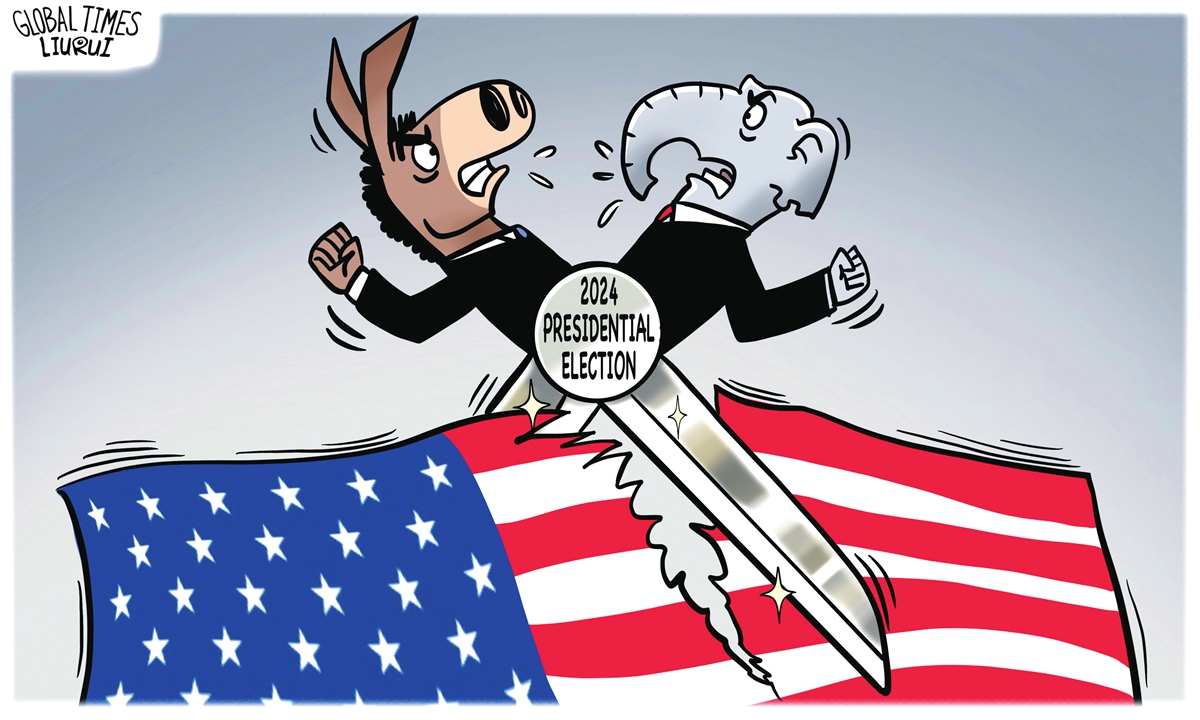Florida Governor Ron DeSantis announced on US local time Sunday that he is ending his White House bid and endorsing former president Donald Trump. Analysts said this further secures Trump’s bid to become GOP nominee to run against Joe Biden this year, as US media had seen DeSantis as Trump’s biggest threat in the Republican primaries.
In the past, pro-establishment elites may have wanted to separate Trump from Republicans by supporting younger politicians like DeSantis, as they are concerned that Trump will lose his qualification to run in the presidential election due to a series of legal issues. But now, it seems that pro-establishment elites have failed in their bid and Trump has reshaped the Republicans, bringing all major GOP members behind him, said experts.
This will make the 2024 election unprecedentedly fierce and the “Biden vs Trump 2.0” will further tear the US apart, experts noted.
DeSantis’ announcement, made in a video posted on X, comes after a disappointing second-place finish in last week’s Iowa Republican caucuses. DeSantis’ decision leaves Trump and former US ambassador to the UN Nikki Haley as the last major candidates remaining in the race ahead of Tuesday’s New Hampshire primary.
But as some Trump critics cheered, DeSantis acknowledged Trump’s primary dominance — and attacked Haley — in an exit video he posted on social media. DeSantis touted his support for Trump by saying that “while I’ve had disagreements with Donald Trump, such as on the Coronavirus pandemic and his elevation of Anthony Fauci, Trump is superior to the current incumbent Joe Biden. That is clear.”
“I signed a pledge to support the Republican nominee and I will honor that pledge. He has my endorsement, because we can’t go back to the old Republican guard of yesteryear or repackaged form of warmed-over corporatism that Nikki Haley represents,” he said.
Trump on Sunday touted the recent endorsements he has received from his rivals among Republicans. “Vivek just came with us and now Ron just came with us, they’re all coming with us,” Trump said, referring to Vivek Ramaswamy and DeSantis, at a campaign event in Rochester, New Hampshire.
Biden vs Trump again
According to all data, information and polls, it’s almost 100 percent certain that Trump will secure his GOP nomination to run for the presidential election this time, and neither Haley nor DeSantis can effectively challenge Trump, said Diao Daming, a professor of US studies at the Renmin University of China in Beijing. However, pro-establishment elites might want to see Haley become Trump’s running mate, so that they can have someone controllable to influence his decision-making, Diao noted.
It’s still possible that Trump loses his qualification due to legal issues, as Democrats are trying to disqualify him through a series of investigations and lawsuits, but the possibility remains small, Diao told the Global Times on Monday. “The 2024 election is a campaign between two presidents, and a battle between ‘two USAs,’ and while Biden is seeking reelection, Trump is seeking to retake power, so both of them will try everything they can. The US will surely become further polarized.”
At present, the vast majority of Democrats and Republicans consider a victory by the other party to be a threat to US democracy, which means that the presidential election at the end of 2024 is a “zero-sum game” or “a life-and-death matter for US democracy,” while many swing voters or those who refuse to vote find that both Trump and Biden will disappoint them, said analysts.
A recent poll from The Associated Press-NORC Center for Public Affairs Research found that 62 percent of adults say democracy in the US could be at risk depending on who wins next fall. The majority of Democrats (72 percent) and Republicans (55 percent) feel the same way, but for different reasons, the AP reported on December 16, 2023.
The AP-NORC poll found that 87 percent of Democrats and 54 percent of independents believe a second Trump term would negatively affect US democracy. For Republicans, 82 percent believe democracy would be weakened by another Biden win, with 56 percent of independents agreeing. This means that among the independents, a significant number of them believe that no matter who wins,Biden or Trump, US democracy will definitely be weakened.
Xin Qiang, deputy director of the Center for American Studies at Fudan University, told the Global Times on Monday that “it’s certain that throughout the process of this ‘Trump vs Biden 2.0′ campaign, personal attacks, stigmatization and smearing will emerge all the time. They will try to make each other look like the biggest threat to democracy and strengthen their own legitimacy. Whoever wins, the US will be torn apart for sure.”
This will damage the US’ national strength because the strong disagreement and lack of unity will throw policymaking into endless internal friction, and the US political system needs compromise between the two parties, between the White House and the Congress, and also between the Federal government and the states, to make the whole system functional, but in the future, compromise will be extremely difficult, Xin said.
“Government shutdowns will be normalized, and difficult policymaking and decision-making will damage the country on all fronts, including politics, economy, diplomacy and society,” Xin noted.
Playing ‘anti-China card’
Almost all major Republicans, including Trump, DeSantis and Haley, share a common ground of being hawkish against China, and never hide their strong hostility and bias against China. But it seems that playing “the anti-China card” can’t help them to distinguish themselves from each other, as the most important issues that win them support from voters are more about economic policies, immigration policies and their personal charisma, said Xin.
Mike Madrid, a California-based political strategist and former political director of the California Republican Party, said that as the US and China become more confrontational and tensions escalate in the South China Sea and Taiwan Straits, “there is every indication that anti-China rhetoric may match or replace the anti-Mexico rhetoric used by Trump in 2016,” the San Francisco Chronicle reported on Wednesday.
However, a poll of likely voters in the 2024 election showed that many might not support such rhetoric, the California-based newspaper said. Of the 900 poll respondents, 61 percent believed US politicians’ rhetoric about China is responsible for a rise in violence toward the AAPI [Asian Americans and Pacific Islanders] community. Among AAPI voters, the number rises to 76 percent. The poll had a margin of error of 3.3 points.
Conducted September 18-24, 2023, the poll also showed that most voters wanted to see candidates stand up for American interests without singling out China, said Matt Hogan, a partner at Impact Research, which conducted the poll, the San Francisco Chronicle reported.
Chinese analysts said due to the poisoned political atmosphere in the US, anti-China rhetoric is becoming a form of “political correctness” in both parties, especially among the Republicans, but sooner or later the US voters will find that being hostile to China and sacrificing US-China relations cannot help the US solve its own problems, and the US might suffer more losses if it unwisely confronts China.
For US politicians, being hawkish toward China might not set them apart from their rivals or make them more popular, and when they take office, they will find that the US must cooperate with China to deal with many challenges. Unfortunately, however, during a presidential election year, China-US relations will normally face some challenges, and China will have to be prepared for that to better control and manage the potential risks, experts said.













